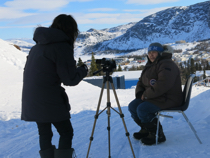The First Ever Labrador Research Forum
January 2017
From fisheries and oceans, to environmental and climate change, Indigenous governance, Indigenous language revitalization, wildlife conservation, and more; there is a wide variety of research happening in Labrador today. And no one knows this better than Labrador Institute Director, and Tradition & Transition researcher, Ashlee Cunsolo.
“A lot of what makes Labrador research so interesting is its northern location, and its subarctic location,” Cunsolo says. “It’s so interesting, the diversity of research that’s happening here. It’s a very fruitful, very rich environment and there are a lot of opportunities to bring people together to further support research through interdisciplinary and multidisciplinary connections.”
That is why the Labrador Institute and a number of local partners are holding the first ever Labrador Research Forum, examining all of the many kinds of research happening across the region from February 15-18, 2017.
The forum will be held in locations across the Upper Lake Melville area with an events in Sheshatshiu, North West River, Happy Valley-Goose Bay, and a final day of storytelling, dog sledding, and boil-ups in Mud Lake.
“We wanted to highlight to everyone the diversity that’s here in Labrador, particularly in the Upper Lake Melville area,” explains Cunsolo. “It’s the seat of three different indigenous groups, you have the South Coast Inuit, you have the North Coast Inuit, you have the Innu Nation, and then everyone that comes from all over the world who populate Happy Valley-Goose Bay. We really wanted to showcase that diversity and that richness.”
Cunsolo says while there have been research forums before in Labrador, never any this large or covering such a wide range of research topics and locations across the region.
“If we’re going to set up a Labrador Research Forum, and we’re going to make it happen every second year, then let’s make it as open as possible and bring everyone together so we’re not in disciplinary niches,” Cunsolo says. “We have the opportunity to work together, but also we have the opportunity for people from Labrador to share their needs and priorities with researchers, and to start pushing out a research agenda from Labrador that’s by the North and for the North.”
She is hoping that the research forum will provide a space where researchers can make connections no matter where they do their research in Labrador.
“So maybe there’s a research project happening in Mary’s Harbour that someone in Nain might be really excited about and this is their first connection. Maybe there’s an innovation in Labrador West that Happy Valley-Goose Bay would like to connect with. We’re hoping to really foster that through the type of environment that we’re creating with the research forum,” Cunsolo hopes.
The forum is designed to be as inclusive and engaging as possible with much time devoted to questions and discussion. Unlike typical academic forums, the Labrador Research Forum focuses on audience involvement.
“We want the conference to be accessible and we want people to feel they can become engaged in all the discussions and the dialogue, but we also want to foster connections among all the people there. So we thought the best way to do it is if you’re going to do a research presentation you get five minutes to describe what you do then it is fifteen minutes for questions and discussion,” explains Cunsolo.
The forum is trying to make it possible for everyone who is interested in participating to attend. For this reason, free registration is offered to community members, elders, students, people living on low incomes, or seniors.
The February event is scheduled to be the first biennial forum, meaning that the organizers want to see this happen once every two years. But that doesn’t mean they don’t want to connect in between.
“We’re hoping that, in the interim, we form a very active group of people who want to support research in Labrador, who want to continue on discussions and plans and foster partnerships and vibrancy”explains Cunsolo. “We’re hoping that by holding this [Research Forum] every second year we’ll have an even bigger gathering each time, bringing more and more people together. We hope it becomes something that people look forward to.”
For more information about the Labrador Research Forum, visit their website and Facebook page. Register now because space is limited. The deadline to submit forum abstracts is January 17th.





